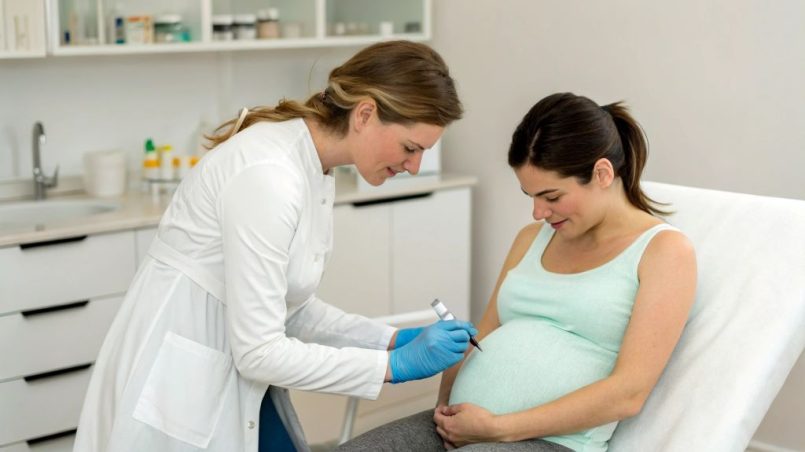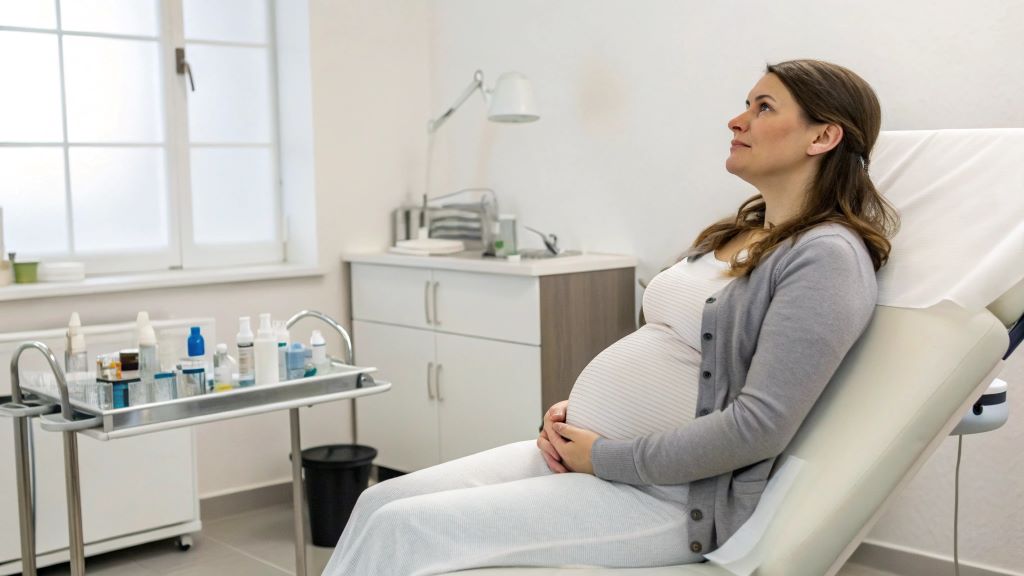Pregnancy is a time of incredible changes—emotionally, physically, and hormonally. With all the adjustments your body is making to support your growing baby, it’s not uncommon to notice unexpected skin conditions, like warts. While generally harmless, warts can be an unwelcome nuisance, especially if they appear in sensitive areas or become painful. Understanding how to manage wart removal while pregnant safely is important for your comfort and your baby’s well-being.
When it comes to skin concerns during pregnancy, safety becomes the top priority. You may be wondering which treatments are safe, what options are off-limits, and whether or not you even need to address the issue during this time. That’s where resources like Ledmain.com come in handy, offering detailed insights on skin health and solutions tailored for pregnancy.
Can You Get Warts During Pregnancy?
Yes, you absolutely can. Warts are caused by the human papillomavirus (HPV), which is very common. Due to the changes in your immune system during pregnancy, your body may not fight off the virus as effectively, making it easier for warts to develop. These growths often appear on the hands, feet, or even the genital area. While they are typically painless, they can cause discomfort or emotional stress, especially if they are located in visible or sensitive regions.
Some women might experience a sudden outbreak, while others may notice existing warts growing larger or spreading. Although these changes can be alarming, warts are generally benign and pose no direct threat to your baby. However, there are exceptions, especially with genital warts, which can sometimes affect the birthing process.
If you’re looking for more comprehensive information on how to get rid of warts during pregnancy, it’s essential to review only trusted and medically reviewed sources. Understanding safe treatment options will help ensure you don’t unintentionally expose yourself or your baby to any risks.
What Causes Warts to Appear or Worsen in Pregnancy?
Warts are the result of HPV, and this virus can live on the skin without causing immediate symptoms. When your immune system weakens—such as during pregnancy—the virus has more opportunity to activate and multiply. This can result in the sudden appearance or growth of warts.
Contributing factors include:
- Hormonal fluctuations
- Increased blood flow to the skin
- Weakened immune response
- Direct contact with the virus through surfaces or personal contact
Pregnant women are not more likely to contract HPV, but the visible symptoms may become more prominent during this time.
Are Warts Harmful to the Baby?
Most types of warts, including common and plantar warts, are not dangerous to your baby. They are a superficial skin condition and typically do not enter the bloodstream. However, genital warts require more careful attention. In rare cases, large genital warts may obstruct the birth canal, or the virus could potentially be transmitted to the baby during vaginal delivery, although this is extremely uncommon.
Therefore, if you notice any warts developing in or near the genital area, it’s essential to consult your healthcare provider promptly. They may monitor the condition or suggest treatment options based on the wart’s size, location, and potential risks during delivery.
Safe Ways to Remove Warts While Pregnant
The good news is that there are several safe options to treat or remove warts during pregnancy. That said, not all over-the-counter or clinical treatments are recommended during this time, so it’s critical to choose wisely.
Safe Wart Removal Options:
- Cryotherapy
A common and generally safe method, cryotherapy involves freezing the wart using liquid nitrogen. This method is often used by dermatologists and is considered low-risk during pregnancy. - Salicylic Acid (With Caution)
Some topical treatments contain salicylic acid. While small amounts are typically considered safe, excessive use or high concentrations should be avoided during pregnancy. Always consult your doctor before using salicylic acid. - Natural Remedies
Some women prefer home remedies like applying apple cider vinegar, banana peels, or tea tree oil. However, these methods have limited scientific backing and may cause skin irritation. Proceed with caution and always do a patch test first. - Laser Therapy
In more persistent cases, laser treatment may be an option. This should only be performed by a qualified dermatologist and with obstetric clearance. - No Treatment (Watchful Waiting)
Sometimes the best approach is simply to monitor the wart. Many warts go away on their own, especially if they are not painful or causing other issues.
For personalized advice, it’s always wise to consult your OB-GYN or a dermatologist experienced in treating pregnant patients.
Treatments to Avoid During Pregnancy
Certain wart removal methods are not recommended during pregnancy due to potential risks to the baby or lack of research.
- Immunotherapy medications
- Prescription retinoids
- Strong topical acids or bleomycin injections
- Over-the-counter freezing kits with dimethyl ether
Always read the ingredient list of any treatment and talk to your doctor before applying anything to your skin while pregnant.
When Should You See a Doctor?
Even if the wart appears minor, it’s best to get a medical opinion during pregnancy. This is especially important if:
- The wart changes color or shape
- You notice rapid spreading
- The wart is painful or bleeds
- The wart is located near the genitals
Your healthcare provider may suggest safer treatment alternatives or refer you to a dermatologist for closer monitoring.
Lifestyle Tips to Prevent Warts During Pregnancy
Prevention is always better than cure. While you can’t always prevent warts, there are ways to reduce your chances of contracting or spreading them during pregnancy.
- Avoid sharing towels, razors, or socks
- Keep your skin clean and dry
- Boost your immune system through a healthy diet
- Wear flip-flops in communal showers or pool areas
- Avoid scratching or picking at warts
Practicing good hygiene and strengthening your immune health can go a long way in wart prevention.
FAQs
- Can warts disappear after pregnancy?
Yes, many women find that their warts shrink or disappear completely after giving birth. This is due to the immune system returning to its pre-pregnancy state.
- Is it safe to use over-the-counter wart removers during pregnancy?
Not all OTC wart removers are safe. Many contain salicylic acid in high concentrations, which should be used cautiously. Always consult your doctor first.
- Will genital warts affect my delivery?
In rare cases, large genital warts may affect the delivery process. Your doctor may recommend a C-section if they believe vaginal delivery poses a risk.
- Are natural remedies effective for warts during pregnancy?
Some people find relief using natural remedies like tea tree oil or apple cider vinegar, but these methods are not scientifically proven. They may cause irritation, so use them with care.
- Can I pass warts to my baby during pregnancy?
While the risk is extremely low, genital warts caused by certain HPV strains can be transmitted during vaginal birth. Most types of warts, however, are not contagious to the baby.
Conclusion
Dealing with warts while pregnant can be frustrating, especially when your treatment options are limited. However, with proper guidance and a cautious approach, it is possible to manage or even remove warts safely during pregnancy. Whether you opt for cryotherapy, natural remedies, or simply monitoring the condition, the key is to stay informed and consult your healthcare provider before starting any treatment.
By staying proactive and prioritizing safety, you can maintain your comfort and peace of mind throughout your pregnancy journey.
Read More:

